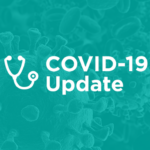CMO Corner- Orange County Covid Updates for December
Did you know Flintstone Vitamin D is only sold in one city in the United Arab Emirates?
Citizens in other cities refuse to eat them.
But Abu Dhabi Do!
As the Covid numbers spike, I feel it may be time for a little humor…yes, I know what you’re saying…very little!
There are three questions I am continually asked, so feel it’s worth addressing in this blog.
1. “Check my Vitamin D level. If it’s low will I have a bad case of Covid?”
ANSWER: Yes and No.
Yes: some studies, most sources quote one from Spain—show a poorer prognosis in Vitamin D deficient people. Vitamin D may help with macrophage activity to destroy the virus. It may help fight the cytokine storm responsible for many Covid deaths. It helps “modulate” the immune system, so important in fighting off a bad viral infection. So start taking Vitamin D, right?
Well……wait.
No: Vitamin D deficiency is more common in older age groups, smokers, obesity, and in those with chronic diseases such as diabetes, hypertension, and also some racial and ethnic groups are more predisposed to deficiencies including African Americans.
The high-risk groups that have more complications and higher mortality rates in COVID-19 coincide with groups that have a high incidence of vitamin D deficiency. So we may just be saying “If you are an older diabetic smoker you will have a poorer prognosis from Covid,” without bothering to check a Vitamin D level.
Will correcting a low Vitamin D level help with Covid? No study shows that, since you should also correct the blood sugar, blood pressure, etc. at the same time.
The venerable Mayo Clinic, in a bulletin to physicians, concludes, “To the best of our knowledge, there is no data on the effects of vitamin D in SARS-CoV-2 infection.” They then opine, “we suggest it would be reasonable to supplement vitamin D in sub-populations at risk of vitamin D deficiency and unfavorable COVID-19 outcomes.”
In other words, those patients we mentioned in the preceding paragraph. I could not find studies controlling for high risk Vitamin D deficient patients.
Our interpretation?
We do not have good evidence Vitamin D will help, but it’s safe so what the heck; give it to seniors, smokers, diabetics, and any other high risk groups just in case.
Another issue is what constitutes Vitamin D deficiency?
Most labs list the lower limit as a level of 30. But most experts define true deficiency as under 15. It makes a difference since most articles quote “80% of severe symptoms with Covid are Vitamin D deficient.”
But when we check Vitamin D levels as part of a yearly checkup, I’d estimate 80% of all our patients are under a level of 30, not 15. Despite heavy research, I couldn’t find studies on Vitamin D levels under 15 and percentages of a Covid prognosis.
Our conclusion?
Taking 2000 units of Vitamin D3 a day will not hurt. If you are a senior, smoker, obese, diabetic, African American, or have hypertension, it may help but be aware evidence is weak.
What’s ultraviolet light’s favorite animal?
A lamb, duh!
Geesh! Tough crowd!
2. Should I use ultraviolet germicidal lighting?
If you own a large building, yes. In your home….read on.
UVC units look like your mosquito zapper on the patio in the summer, but these rays zap viruses. They have been used to fight viruses since a measles epidemic in Philadelphia in 1937. Numerous studies show when used correctly, UVC produces the same result as replacing the air in a large room 10 times in an hour. It is safe and effective to add a layer of protection against most viruses.
Cost? For large buildings, where it is most useful, about $6 a square foot. So for the Yorba Linda packing house at 77,000 square feet, about a half a million dollars. They are already in use in many colleges, as well as certain high traffic areas of LAX. They definitely add a effective layer of protection.
Go on Amazon, you will find portable UVC wands for about $50. You wave it over your body and your friends and family. They have room sanitizing UVC lights for under $100. Perfect right?
Well… in fact there are no studies revealing how much or how long to use these devices, or that they even work.
The biggest issue is that these zap viruses IN THE AIR floating around, just waiting to zip into your nose and infect you. They have NO effect for viruses already in your body, or if they aren’t floating around.
Our conclusion?
Installing UVC devices in indoor public spaces would cost a fraction of the budget our elected officials have spent to mitigate the economic impact of this virus. As far as buying a wand or a room unit for your family room? Might be better to open a window….
The lab report said I had blood Type A.
But it was a Type-O.
Hey, these are the jokes!
3. Will knowing my blood type predict the severity of a Covid infection?
From a study recently published at Harvard Medical School and Massachusetts General,
“Blood type is not associated with a severe worsening of symptoms in people who have tested positive for COVID-19.”
When you try to research this in the medical literature, there are two different searches.
First, studies that look at IF you have Type O blood. Then perhaps you may have a lower risk of getting infected. The data is very anecdotal. And weak. Most of it falls into what doctors call the “letter to the editor” category. Interesting to read, but not nearly enough data to substantiate the claim.
Then there are the studies that look into IF you have Type O blood. Then you’re less likely to get very sick and less likely to need a ventilator in the ICU than if you have Type A blood. Same; interesting theory but the data is just weak.
For both categories they are retrospective studies. They look back, and analyze the cases after the fact. Much preferred would be prospective, randomized clinical trials. Those are lacking, in fact, I could not find even one.
Our conclusion?
We are not at the point where we can say, “You have Type O blood so don’t wear a mask,” or, “even though your oxygen level is low, you don’t have to stay in bed with Covid, since you are Type O.” It is possible a certain blood type makes better antibodies. We just need more–and better –data.
Questions I cannot address yet are the multitude of rumors about the upcoming vaccine.
• Most insurances will not cover
• It will be free
• It will be given to seniors first
• It will be given to hospitals first
• It may wear off after three months
• It will have few side effects
• It will have many side effects
• It will only be given to certain assigned centers in each county
• It will not stop the pandemic
• It will get things back to normal
Those are all possible scenarios. We need a month or two to find the answers.
I also have a vaccine joke.
But a lot of people won’t get it.
I’m here all week.
Gregg DeNicola MD
Chief Medical Officer
PDQ Urgent Care and More



